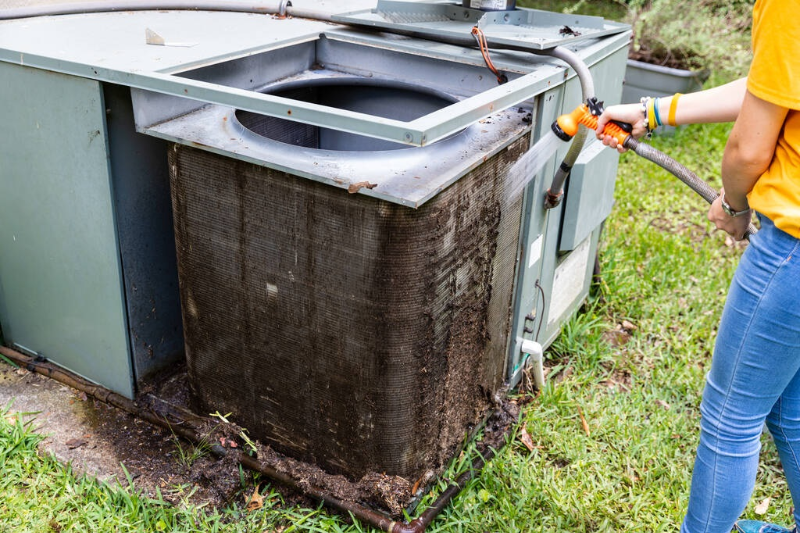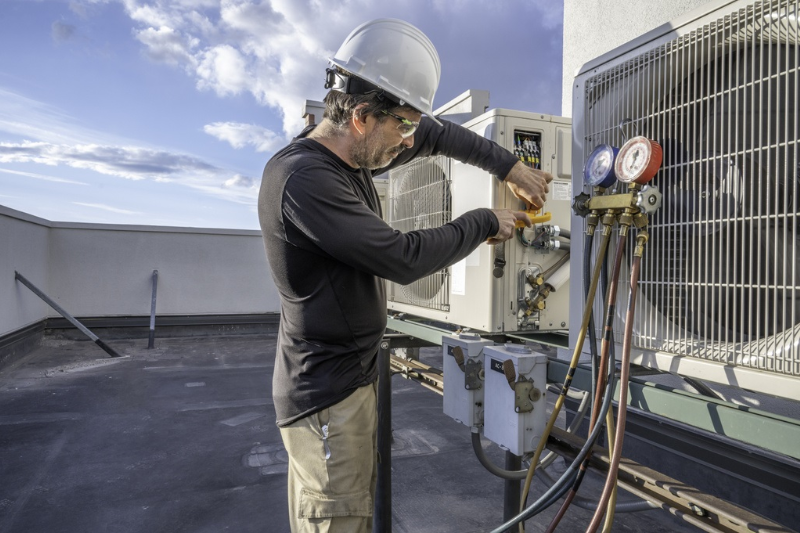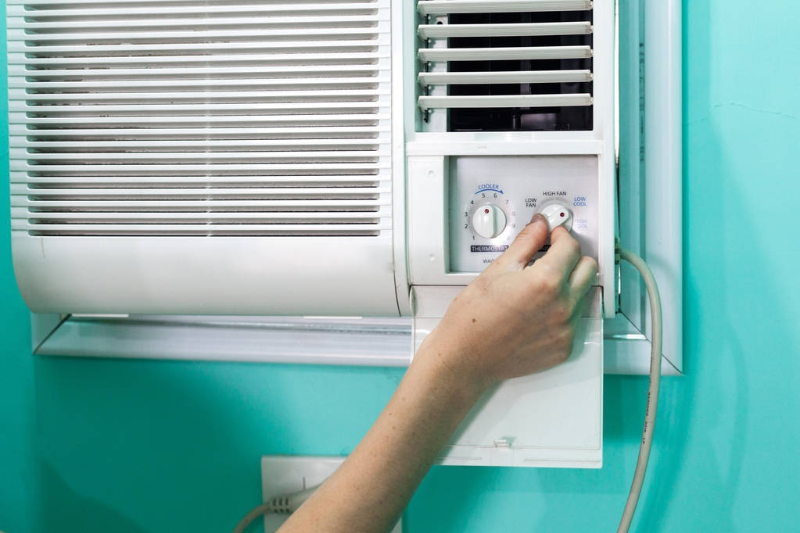Table Of Contents
When the scorching summer heat arrives, few things are more frustrating than turning on your air conditioner only to find that it’s not cooling correctly. Before you panic or rush to call a technician, it’s worth exploring some troubleshooting steps you can take to potentially resolve the issue yourself.
Common Causes of Air Conditioner Cooling Issues
Dirty or clogged air filters
One of the most common reasons for poor cooling performance is dirty or clogged air filters. Over time, dust and debris accumulate, restricting airflow and hindering the cooling process. Check your air filters regularly and perform routine cleaning or replacement as needed. This simple step can make a significant difference in the efficiency of your air conditioner.
Thermostat settings
Sometimes, the problem might not lie with the air conditioner but rather the thermostat settings. Ensure that your thermostat is set to “cool” and the temperature is lower than the room temperature. Additionally, check the thermostat batteries to ensure they are not depleted.
Blocked air vents and ducts
Blocked or closed air vents can disrupt the airflow and cause uneven cooling throughout your home. Ensure all air vents are open and free from obstructions such as furniture, curtains, or dust. Similarly, inspect the ductwork for gas leaks or blockages that impede the airflow. Sealing leaks and cleaning ducts can improve the overall cooling efficiency.
Outdoor unit and condenser coils
The outdoor unit houses the condenser coils, which are crucial in cooling. If the coils are dirty or covered in debris, they cannot efficiently transfer heat, resulting in reduced cooling performance. Regularly clean the condenser coils to remove dirt, leaves, and other obstructions. You can do this by gently rinsing them with a garden hose.
Refrigerant leaks or low levels
Refrigerant is a liquid that absorbs heat from the indoor air and cools it down. If there’s a refrigerant leak or the level is too low, the air conditioner won’t be able to cool effectively. Look for signs of refrigerant leaks, such as hissing sounds or oil stains near the unit. If you suspect a leak or low refrigerant levels, it’s best to call a professional HVAC technician to handle the repair.
Troubleshooting Steps
Now that you’ve known the common causes of AC cooling issues let’s dive into some do-it-yourself solutions to address air conditioner cooling issues.

Checking and cleaning air filters
Locate the air filters in your system, usually found in the return air duct or near the indoor unit. If they are dirty, remove and clean them according to the manufacturer’s instructions. Alternatively, replace them with new filters. Clean filters improve airflow, enhance cooling efficiency, and maintain good indoor air quality.
Assessing and adjusting thermostat settings
Check the thermostat settings and ensure it’s set to “cool.” Adjust the temperature to a lower setting than the current room temperature to activate the cooling process. If your thermostat has batteries, replace them if necessary.
Examining and clearing air vents and ducts
Inspect all air vents in your home to ensure they are open and unobstructed. Move any furniture or objects that may be blocking the airflow. Next, check the ductwork for leaks or blockages. Seal any leaks with duct tape or call a professional to fix them. Consider scheduling professional duct cleaning to remove accumulated dust and debris.
Inspecting the outdoor unit and condenser coils
Head outside and examine the outdoor unit. Clear away any debris, leaves, or vegetation blocking the airflow. Gently spray the condenser coils with a hose to remove dirt and grime. Be careful not to bend or damage the fins. Properly maintained condenser coils ensure optimal cooling performance.
Dealing with refrigerant leaks or low levels
A qualified HVAC technician best addresses refrigerant leaks or low levels. They have the expertise and equipment to detect and repair leakages and ensure the refrigerant is at the appropriate level. Refrigerant handling requires specialised knowledge, so leaving this task to the professionals is crucial.
When to Call an HVAC Technician
While many cooling issues can be resolved through DIY efforts, specific problems require professional intervention. Consider calling an HVAC technician under the following circumstances:

Inadequate cooling despite troubleshooting
If you’ve gone through the troubleshooting steps mentioned earlier and your air conditioner is still not cooling correctly, it’s time to call in an HVAC technician. They have the expertise to diagnose complex issues and recommend appropriate solutions.
Strange noises or odours
Unusual noises like grinding, banging, or squealing, as well as unpleasant odours from your air conditioner, indicate potential mechanical problems. These issues often require professional attention to prevent further damage and ensure safe operation.
Airflow issues
If you notice weak or inconsistent airflow from your vents, it could be due to problems such as a malfunctioning blower motor, damaged ductwork, or blocked air ducts. A well-functioning AC should be blowing cold air whenever it is set appropriately. An HVAC technician can assess the situation and make repairs to restore proper airflow.
Persistent refrigerant leaks
Refrigerant leaks not only affect cooling performance but can also harm the environment. Suppose you’ve detected a refrigerant leak or suspect low refrigerant levels. In that case, contacting a technician who can locate and repair the leakage and recharge the system with the appropriate refrigerant is crucial.
Electrical issues
Suppose you experience electrical problems such as tripped breakers, frequent system shutdowns, or flickering lights when your air conditioner is running. In that case, it’s essential to seek the expertise of an HVAC technician. Electrical issues can be complex and potentially dangerous, so it’s best to have a professional diagnose and resolve them.
Frozen evaporator coils
If you notice a layer of ice forming on your indoor evaporator coils, it indicates an underlying issue. Common causes include restricted airflow, low refrigerant levels, or problems with the blower motor. An HVAC technician can identify the root cause and implement the necessary repairs to prevent further coil freezing. With these repairs, you can continue enjoying quality cooled air.
System age and inefficiency
If your air conditioner is approaching its expected lifespan (typically around 10 to 15 years), it may struggle to cool your home efficiently. Older air cons are prone to breakdowns and may not meet modern energy efficiency standards. An HVAC technician can assess the overall condition of your system and advise whether it’s time for a replacement.
Warranty repairs
If your air conditioner is still under warranty, it’s crucial to consult an HVAC technician authorised by the manufacturer. Attempting repairs yourself or hiring an unauthorised technician can void the warranty. A qualified professional will ensure that all repairs are done according to the warranty guidelines, preserving your coverage.
Complex system malfunctions
Air conditioning systems are complex, especially split systems, with various components working together. If you encounter complex malfunctions, such as issues with the compressor, motor, or control board, it’s best to rely on the expertise of an HVAC technician. They have the knowledge and diagnostic tools to pinpoint and repair complex system problems.
Health and safety concerns
If you suspect your air conditioner is contributing to health issues, such as poor indoor air quality, mould, or mildew, it’s crucial to involve an HVAC technician. They can perform indoor air quality tests, inspect the system for contaminants, remove mould and mildew and recommend appropriate measures to address health and safety concerns.
Avoiding Cooling Problems
Regular preventive maintenance keeps your air conditioner running smoothly and avoids cooling issues. Here are some tips to help you maintain optimal cooling performance:

Regularly clean the condenser coils
Dirty condenser coils hinder heat transfer, reducing cooling efficiency. Include cleaning the condenser coils as part of your preventive maintenance routine. Remove the debris and rinse gently with a hose to maintain optimal airflow.
Check and adjust the fan blades
Over time fan blades can become loose or dirty, affecting airflow and cooling performance. Periodically inspect the fan blades and tighten any loose screws. Clean the blades if dirty, but exercise caution to avoid bending them.
Keep the outdoor unit clear of debris
Regularly clear away leaves, branches, grass clippings, and other debris around the outdoor unit. Trim any nearby bushes or plants to ensure they don’t obstruct the airflow. A clean and unobstructed outdoor unit promotes efficient cooling.
Schedule professional duct cleaning
Over time, dust, allergens, and debris can accumulate in your home’s ductwork, restricting airflow and reducing cooling efficiency. Consider scheduling professional duct cleaning every few years to maintain optimal air quality and airflow throughout your home.
Invest in an annual maintenance contract
Many HVAC companies offer annual maintenance contracts or air conditioning servicing agreements. These agreements typically include routine inspections, cleanings, and tune-ups for your air conditioning system. Regular professional maintenance helps identify and address potential issues before they become significant problems, ensuring your system operates efficiently.
Monitor and adjust thermostat settings
Avoid setting your thermostat too low, as it may strain the system and increase energy consumption. Instead, aim for a comfortable temperature and consider using programmable thermostats to optimise cooling when you want cold air at home.
Insulate and seal your home
Proper insulation is crucial for maintaining a cool indoor environment. Insulate your walls, floors, and attic to reduce heat transfer. Seal gaps around your windows and doors to prevent warm air infiltration. Additionally, consider installing reflective coatings on windows to minimise heat gain.
Monitor your air conditioner’s performance
Pay attention to any changes in your air conditioner’s performance. Note if it’s taking longer to cool your home if certain rooms feel warmer than others, or if your energy bills have significantly increased. These signs may indicate a developing problem that requires professional attention.
By implementing these preventive maintenance tips, you can maximise the lifespan of your air conditioning system, enhance energy efficiency, and minimise the likelihood of cooling problems occurring in the first place. Regular maintenance is vital to running your air conditioner smoothly and ensuring your home stays cool and comfortable.
Staying Cool and Comfortable
Dealing with an air conditioner that’s not cooling can be frustrating, but following the troubleshooting steps can often resolve the issue. Remember to check and clean air filters, assess thermostat settings, clear air vents and ducts, inspect the AC unit’s condenser coils, and seek professional help. Practising preventive maintenance and taking care of your air conditioner allows you to enjoy a cool and comfortable home throughout the summer.



